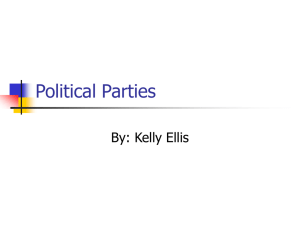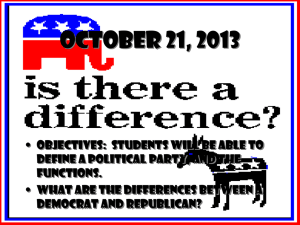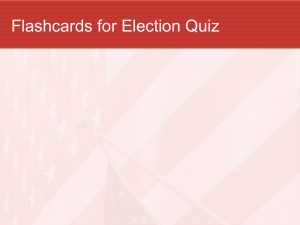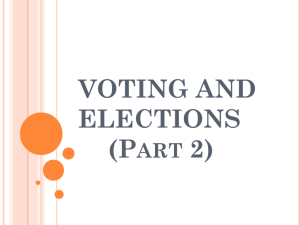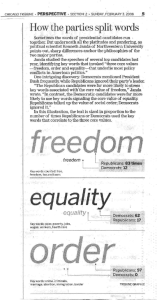WARM UP
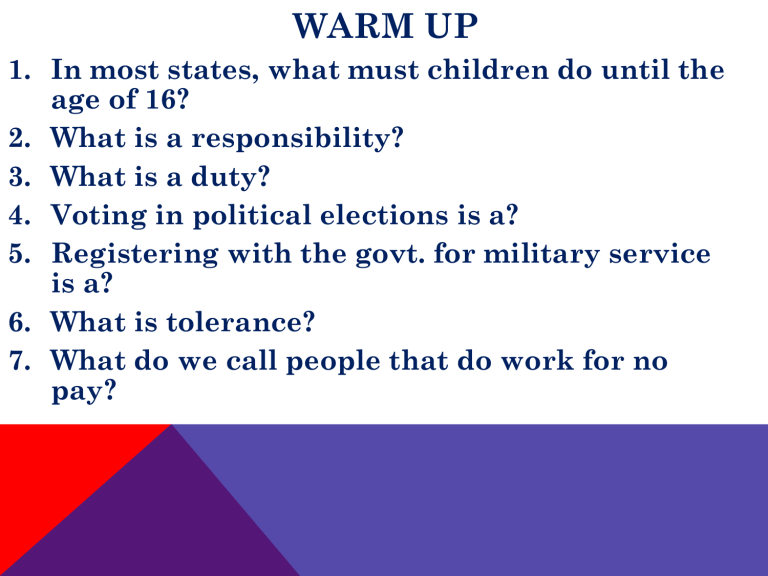
WARM UP
1. In most states, what must children do until the age of 16?
2. What is a responsibility?
3. What is a duty?
4. Voting in political elections is a?
5. Registering with the govt. for military service is a?
6. What is tolerance?
7. What do we call people that do work for no pay?
PARTY SYSTEMS
One Party System
Only 1 party is allowed to exist
China, Cuba
Multi-Party System
Found in many European countries
Plurality – one party wins more seats than all others
Majority – one party wins more than half of available seats
Coalition – alliance with another party
Problems – tough to get a majority & can cause disorder & confusion
Two Party System
• U.S. – Democrats & Republicans
• There are other parties but are a minority
• Major difference between the 2 parties is that the Democrats feel the govt. should be more directly involved in the lives of the people and
Republicans feel a strong economy will help people to help themselves.
WHICH OF THE FOLLOWING BEST
DESCRIBES THE ELECTORAL COLLEGE?
1. The popular vote carries more weight
2. This primary race helps narrow the field of candidates
3. It is a body of electors who pledge to vote for a candidate after the popular vote
4. It is a way that citizens can propose new constitutional amendments
THIRD PARTIES
• Minor parties that challenge the 2 dominant parties
• Never held the presidency
• Influence the candidates for presidency
• Can steal votes from a party causing the other dominant party to win
• Populist Party – 1890s – farmers – wanted direct election of Senators and an 8hr work day
• Progressive Party – aka Bull Moose Party – Split from
Republicans in 1912
• Reform Party – formed in 1992 – gained 19% of vote
3 RD PARTIES BASED ON 3 THINGS
Can be one or all three
Single Issue – Ex: Green
Political Beliefs – Libertarian – limited gov’t interference on business
Single Candidates –
Ross Perot
Ron Paul - 2008
Almost Hillary Clinton in 2008
They sometimes act as spoilers and take votes away from the major parties.
They sometimes influence the major parties with ideas .
THIRD PARTIES IN US HISTORY
Ross Perot
Reform Party
1992
George Wallace
American Independent Party
1968
Ralph Nader
Green Party
2000, 2004
Teddy Roosevelt
Bull Moose Party (Progressive)
1912
WHICH OF THE FOLLOWING IS THE
LEGAL DUTY OF CITIZENSHIP?
1. Register and vote
2. Hold elective office
3. Keep informed about issues
4. Obey laws
POLITICAL PARTY FUNCTIONS
• Main purpose – to get candidates elected to office
• Encourage people to participate
• Express opinions
• Get involved in government
• Patronage – giving special positions to loyal party workers
POLITICAL PARTY FUNCTIONS CONT.
• Parties nominate the candidate
• Campaign for the candidate
• Inform citizens
• Help manage government
• Link different levels of government
• Act as a watchdog – make sure the other party doesn’t become corrupt
• Grassroots movement – idea that starts with a group of people and moves to the national scene
PARTY BELIEFS
• Political Machine – strong party organization that has its candidates elected year after year and dominates a local area – Tammany Hall
• Platform – the goals of the party or stance on all issues
• Plank – a party’s stance on one issue
FAMOUS POLITICAL MACHINES
Chicago Democratic
Machine
Richard J. Daley (50s,
60s, and 70s)
Richard M. Daley (1989 – present)
Other major cities have political machines
PARTY ORGANIZATION
National Chairperson
At the top
Runs the national committee
Followed by state, county , city etc
Ward Boss
Second smallest
Runs a couple of neighborhoods
Precinct Committeemen
Smallest – a neighborhood committee
Look at the chart on page 280 for help
Reince Priebus
PARTY ORGANIZATION
Political Party Organization
National Committee this is the top level of the party
State Committee
County or Local Committee
Tim Kaine
Precinct Organization party members
Linda Daves
David Young
NOMINATING CANDIDATES
• Caucus – meeting of party members
• Nominating Convention – delegates are chosen by party members to select the candidate
• Direct Primary Elections – registered voters choose the candidates – 2 types
Open Primary – party membership not required to vote
Closed Primary – only registered party members can vote
U.S. PARTY SYSTEM
• Washington & Madison warned against parties
• Jefferson – anti-Federalist – became Democratic-
Republicans
• Hamilton & Adams – Federalist
• Era of Good Feelings – Monroe
• Only 1 party – Federalists died out after the War of 1812
• Whigs rise to power against Jackson’s Democrats
• Civil War – Republicans rose to power as opponents to slavery
